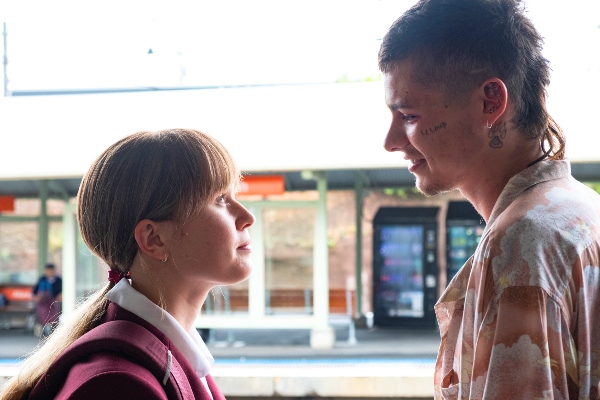

There are moments in Shannon Murphy’s debut film where the camera lingers on a young teenage girl’s face and you can practically feel her absorbing all the beauty, pain, and raw emotion in the world—and feel it with her. The Australian film confoundingly braids strands of teen romance, disease-of-the-week weepies, quirky comedy, and sobering statements about the dangers of drugs, sometimes losing the threads altogether. Yet Babyteeth’s sheer sense of life gives it a rare power that woolgathering can’t drag down.
The movie starts with a literal shove when a young man rushing for a train knocks a schoolgirl flat to the station platform. Deploying the raffish charm of the late Amy Winehouse’s spouse Blake Fielder-Civil, the tattooed bad boy stops to flirt with the shaken young girl. Milla (Eliza Scanlen) and Moses (Toby Wallace) are headed for a relationship that will go through wild ups and downs, pull in her parents, and give Milla a too-brief taste of the joys—and terrors—of intimacy.
Because, you see, Milla has cancer. She copes by trying on wigs, refusing to go to her violin lessons, and racing off to a nightclub with Moses, much to the consternation of her bourgeois mom and dad. Unlike most movies featuring a rebellious teenager, the movie allows us to see the girl’s parents grow as characters. Her mother, Anna (Essie Davis, known to U.S. audiences from The Babadook), starts out as cartoonishly uptight and develops into a fierce, loving force of nature. The father, Henry (Ben Mendelsohn), initially gruff, reveals vulnerabilities that tie him to his wife and the delinquent young man now spending so much time around the family’s suburban house.
Drugs emerge as a tool of control. Henry takes morphine to cope with misery and a difficult marriage. In turn, he doles pills out to Anna to take the edge off her rage and anxiety and dangles drugs as an inducement for the addicted Moses to move into the house and keep Milla company. Ironically, the sickest, most endangered member of the household is the only one who can face reality straight on; it’s those around her who need their fixes. Milla’s rage to live is perhaps its own kind of drug, and the film gains depth as it focuses on the other characters’ experience of her illness as a shared fate.
All is not sorrow, and subplots fall back on sometimes silly indie kookiness. In a film with many surprises, some unexpected elements ground the story and the mood. One is classical music, which implies a structure behind sometimes unruly material and creates intimacy in poignant ways (the soundtrack is one of the most eclectic and catchy in recent memory and will have hipsters reaching for their Shazams to name the intriguing tunes).
Another theme is the spirit of hope that clings to the dying. It is not mawkish or corny, but defiant. Although its central character is painfully young, Babyteeth urges us to seize life and really live it.






Leave A Comment